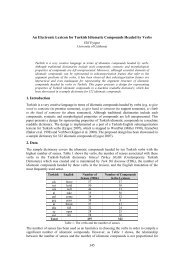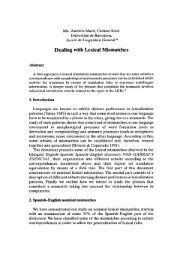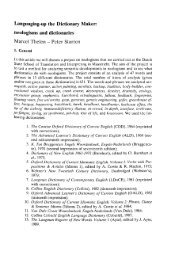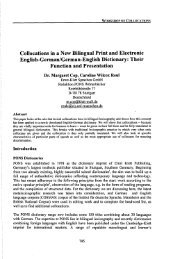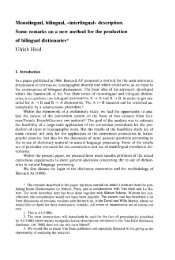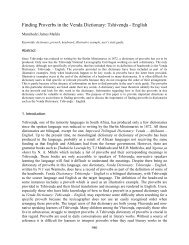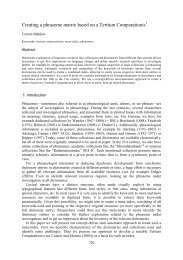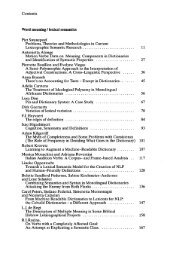Mary Snell-Hornby THE BILINGUAL DICTIONARY - HELP ... - Euralex
Mary Snell-Hornby THE BILINGUAL DICTIONARY - HELP ... - Euralex
Mary Snell-Hornby THE BILINGUAL DICTIONARY - HELP ... - Euralex
Create successful ePaper yourself
Turn your PDF publications into a flip-book with our unique Google optimized e-Paper software.
German and English lexemes concerned, and also with the function<br />
of the verb in the text. Furthermore, and for this paper most<br />
significant: the number of errors did not depend on whether the<br />
use of a dictionary was permitted, although the type of information<br />
found in the dictionaries was crucial. The monolingual dictionaries<br />
were found to provide reliable, if sometimes incomplete information,<br />
while the bilingual dictionaries proved unsatisfactory. This<br />
was due especially to the uncommented lists of synonyms mentioned<br />
above, which only provide real help in jogging the memory of<br />
the bilingual user already familiar with them. In this case the<br />
suggested English equivalents^were usually unknown to the students,<br />
who said they often chose at random. Far more successful was<br />
a specially worked out form of guided help, whereby the English<br />
verbs were arranged in paradigms and their components analyzed<br />
to reveal the crucial points of differentiation between them<br />
and indicate their typical collocations or realization in a<br />
context.<br />
I would like to illustrate this by analyzing the three close<br />
English synonyms hurl, fling and toss, all of them equated in<br />
the five bilingual rTictionaries I checked 2<br />
with schleudern and<br />
werfen. In their transitive usage, hurl, fling and toss all<br />
describe specifically modified acts of throwing, the main differences<br />
between them being seen in the force of the movement and<br />
in the weight of the object thrown. Hurl focusses on violent<br />
movement, usually of a heavy object:<br />
(3a) Bedsteads, cupboards, sofas were propelled out upon<br />
the balcony and hurled from there into the courtyard.<br />
Fling indicates impulsive or angry movement without specification<br />
ot the object:<br />
(3b) (i) Meanwhile, Otto had flung himself upon Arthur<br />
like a young bear.<br />
(ii) He tugged the ruby from his finger and flung<br />
it at her.<br />
Toss focusses on careless or nonchalant throwing, typically of a<br />
light object:<br />
(3c) They drank. They smoked. All twelve smokers tossing<br />
the butts on to the tiled roof that sloped towards<br />
the farm buildings.<br />
German schleudern, on the other hand, expresses vehement movement<br />
and focusses on the sweeping movement of the arm, typically<br />
designed to send the object, whose size and weight is left open,<br />
over some distance:<br />
(3d) Offenbar hatte sie erwartet, dass ich aufspringe und<br />
Steine schleudere, um die Leute zu vertreiben wie<br />
eine Gruppe von Ziegen.<br />
Having stressed these common components and points of differentiation,<br />
described by Leisl (1962) as "Zonen der Deckung" and<br />
"Zonen der Verschiedenheit", we can see that such lexemes are



